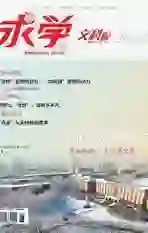找准突破口,专啃硬骨头
2019-03-30杨春吉
杨春吉
高考对状语从句的考查逐步由单选题过渡到语法填空题、短文改错题及书面表达题。考生掌握状语从句的用法,不仅有助于理解句子、篇章,在書面表达中更高级地表达语义,而且对于高阶英语学习有重要的意义。
一、时间状语从句
1.when,while,as的用法
(1)when从句的谓语动词可以是持续性动作,也可以是短暂性动作。
(2015北京卷书面表达)When the craftsman came into the classroom, we gave him a warm welcome. 当名匠走进教室时,我们报以热烈的掌声。
(2)while从句的动作必须是延续性的,它用作并列连词时,意为“然而,却”,表示转折、对比关系。
(2018北京卷书面表达)I sat beside a table, explaining every step of the process while making tea. 我坐在桌旁,一边沏茶,一边解释沏茶的每一步骤。
(3)as从句的动作是延续性动作,强调主句、从句的动作同时进行,有“渐进变化”之意,意为“随着……;一边……一边……”。
(2016天津卷·7)_____the average age of the population increases, there are more and more old people to care for.
A. Unless B. Until C. As D. While
【答案】C
【解析】 本题考查as引导的时间状语从句。句意:随着人口平均年龄的增加,越来越多的老人需要照顾。unless除非;until直到;as因为,正如,随着;while虽然,然而,当……时。根据语境,选C项。
2.until的用法
(1)用于肯定句,表示主句的动作持续到从句的动作开始为止。
(2017北京卷·28)If you dont understand something, you may research, study, and talk to other people you figure it out.
A. because B. though C. until D. since
【答案】C
【解析】本题考查until引导的时间状语从句。句意:如果你无法理解某个东西,你可以研究、学习并和他人探讨,直到你搞清为止。根据句意“……直到你搞清为止”可知用until。
(2)用于否定句,表示主句的动作在从句的动作发生后才开始。
We were told that we should follow the main road until we reached the central railway station. 直到我们到达中心火车站,才有人告诉我们应该沿着主路向前走。
3.before的用法
before意为“在……之前;没来得及……就……;不到……就……”,多用于完成时。
(2016上海卷·30)A dozen ideas were considered the chief architect decided on the design of the building.
A. because B. before C. whether D. unless
【答案】B
【解析】本题考查before引导的时间状语从句。句意:首席建筑师在决定该建筑的设计之前,考虑了十二个点子。before在此意为“在……之前”,符合语境和题意。
4.since的用法
since意为“自……以来”,从句用一般过去时,主句用现在完成时。
(2016天津卷书面表达)Two weeks have passed since you came to our school for the exchange program, which we all have benefited from. 自从你来到我们学校参加交换生计划以来,两周已经过去了,我们也由此受益匪浅。
5.重要句型
(1)It is/has been+时间段+since-clause。若since从句的谓语动词是非延续性动词,则表示从句中的动作延续了××时间;若since从句的谓语动词是延续性动词,则表示从句中的动作已结束××时间了。
It is five years since I smoked. 我戒烟已有五年的时间了。
It has been just a week since we arrived in Beijing. 我们到达北京刚好一周。
(2)It +be/will be +一段时间+before -clause。若主句的be用了was 或 wasnt, 意为“过/没过多久某人干了某事”;若主句中的be 用了will/wont be ,则意为“过/没过多久就会发生某事”,从句用一般现在时表示将来。
It was three years before he designed the supermarket.在他设计出超市的图纸前已经过去三年。
It will be ten years before they complete the great railway.他们将用十年的时间把这条大铁路建成。
(3)It is/was +具体时间+ when-clause. 该句型意为“当某事发生时,时间是在……”。
(2014江西卷·35)It was the middle of the night my father woke me up and told me to watch the football game.
A. that B. as C. which D. when
【答案】D
【解析】本題考查when引导的时间状语从句。句意:当我的父亲唤醒我并告诉我看足球赛时,那是半夜时分。本句中的when my father woke me up and told me to watch the football game是一个时间状语从句,主句的主语是it,指代时间,故D项正确。
该题容易和强调句型相混淆。试比较:① It was nine oclock they reached home last night. ② It was at twelve oclock sharp they returned home yesterday evening. 两题的答案分别是when;that。①题,it指时间,when引导时间状语从句。②题是强调句,强调时间状语at twelve oclock sharp。
(4)when用作并列连词,相当于and then,and at this/that time。常用句型有:
①主语+过去进行时+when-clause;
②主语+were/was about to do sth.+when-clause;
③主语+were/was+on the point of doing sth.+when-clause;
④主语+过去完成时+when-clause。
(2016北京卷·21)Jack in the lab when the power cut occurred.
A.works B. has worked C. was working D. would work
【答案】C
【解析】 本题考查“主语+过去进行时+ when-clause”句型。句意:突然断电时,杰克正在实验室里工作。根据occurred可知,这里指过去某时刻正在发生的事情,断电时杰克正在工作,所以用过去进行时,故选C项。
【知识拓展】as soon as,immediately,directly,instantly,the moment,the minute, the instant,no sooner...than...,hardly/scarcely...when...等连词(词组)引导时间状语从句时,意为 “一……就……”,从句用一般时态表示将来。
二、条件状语从句
条件状语从句通常用if,unless,as/so long as,in case,once等来引导。
(1)if(如果,假如),既可引导真实条件句,也可引导虚拟条件句。引导真实条件句时,遵循“主将从现”的时态规律;引导虚拟条件句时,主句、从句根据虚拟语气的语法规则,对应使用相应的时态。
(2018北京卷·2) we dont stop climate change, many animals and plants in the world will be gone.
A. Although B. While C. If D. Until
【答案】C
【解析】本题考查if引导的真实条件句。句意:如果我们不阻止气候变化,那么世界上的很多动植物将会消失。although 尽管;while当……时,尽管,然而;if如果;until直到。根据句意,选C项。
(2018天津卷·15)If we the flight yesterday, we would be enjoying our holiday on the beach now.
A. had caught B. caught C. have caught D. would catch
【答案】A
【解析】本题考查if引导的与过去事实相反的虚拟条件句。句意:如果我们昨天赶上飞机的话,我们现在就在海滩享受假期了。根据时间状语yesterday可知,从句表示与过去事实相反的情况,所以用had+v-ed,故选A项。
(2)unless ( =if... not,除非,如果,除了) ,引导真实条件句,从句时态遵循“主将从现”的时态规律。
Unless you can sleep well, youll lose the ability to focus on, plan and stay motivated after one or two nights. 除非你能睡个好觉,否则一两个晚上之后你就会失去专注、计划和保持动力的能力。
(3)as/so long as(只要……就……),表示明确的现实条件,不具有假设含义。
You wont find paper cutting difficult as long as you keep practicing it.只要你坚持练习,你就不会觉得剪纸难。
(4)in case (假如,万一,倘若),表示真实条件,从句时态须遵循“主将从现”的时态规律。
Ill be out for some time. In case anything happens, call me up immediately. 我要出去一段时间。万一发生什么事,请立即给我打电话。
(5)once(一旦……就……),引导真实条件句。
Once you start eating in a healthier way, weight control will become much easier. 一旦你开始以更健康的方式进食,控制体重就会变得容易得多。
【知识拓展】以下连词(词组)可表示条件:suppose/supposing如果,假使;provided/providing that如果;on/upon condition that以……为条件;等等。
三、让步状语从句
1.wh-ever词引导的让步状语从句(习惯上把however引导的让步状语从句也归在其内)
wh-ever词包括whatever,whichever,whoever,whomever,whenever,wherever等,意为“无论……”。 wh-ever词可以转化为no matter +wh-词(however转化为no matter how),引导让步状语从句时两者可互换。
(2018浙江卷书面表达)I tend to consult consumption whatever I purchase. 无论我买什么,我都倾向咨询消费情况。
2.no matter + wh-词引导的让步状语从句(包括no matter how 引导的让步状语从句)
no matter无词义,它与wh- 词共同构成“无论……”。此外,no matter + wh-词引导的让步状语从句不用倒装语序。
The moral of the story is: Spare no effort to acquire knowledge and never get discouraged easily no matter how the situation is. 这个故事的寓意是:不遗余力地获取知识,无论处境如何,都不要轻易气馁。
3.although/though引导的让步状语从句
although/though从句不与but连用,但可以與still或yet连用。although/though引导的从句多位于句首。从句用倒装语序时常用though。
Although birds use their feathers for flight, some of their feathers are for others purposes. 虽然鸟类利用它们的羽毛飞行,但它们的一些羽毛还有其他用途。
4.even though/if引导的让步状语从句
even though/if意为“尽管,即使”。even if引导的从句具有强烈的假设性,而even though则多以引导的从句为前提。even though/if引导的从句多用陈述语气,间或用虚拟语气。
My grandfather still plays tennis now and then, even though he is in his nineties.我祖父虽然已经九十多岁了,但他仍然不时地打网球。
5.while引导的让步状语从句
while 作“虽然,尽管,即使”解,相当于so/as long as。
While online shopping has changed our life, not all of its effects have been positive.虽然网上购物改变了我们的生活,但并非所有的影响都是积极的。
6.whether...or...引导的让步状语从句
whether...or...意为“无论……还是……;不管……都……”,它引导的从句常位于句中或句首。
(2016四川卷书面表达)Whether we like riding, jogging or going on long walks, spring allows us to enjoy outdoor activities that we had to put on the back burner during winter. 不管我们是喜欢骑马、慢跑还是长距离散步,春天都能让我们享受到冬天不得不放弃的户外活动。
7.when引导的让步状语从句
when意为“既然,尽管”,它引导的从句常位于主句之后,一般不与主句用逗号隔开。
Why do you want a new job when youve got such a good one already? 既然你已经有这么好的一份工作了,为何还要找新工作呢?
四、结果状语从句
引导结果状语从句的从属连词有so...that...和such...that...,其结构形式为:
(1)so+形容词/副词+that从句;
(2)so+形容词+a/an+可数名词单数+that从句;
(3)so+many/much/few/little+名词+that从句;
(4)such+a/an+形容词+可数名词单数+that从句;
(5)such+形容词+名词复数/不可数名词+that从句;
Paulson screamed so loudly that her daughter came running from the house. 帕尔森的尖叫声那么大以至于她的女儿从房子里跑了出来。(so+副词+that从句)
五、目的状语从句
目的状语从句通常用in order that,so that,in hopes that等来引导,从句谓语动词多用情态动词can,could,may,might等。
(2018天津卷·4)Lets not pick these peaches until this weekend _____ they get sweet enough to be eaten.
A. ever since B. as if C. even though D. so that
【答案】D
【解析】本题考查so that引导的目的状语从句。句意:
让我们这周末再摘这些桃子,这样它们会变得足够甜。从句部分明确给出主句这件事的目的,故选D项。
六、地点状语从句
地点状语从句通常用where,wherever来引导。where引导地点状语从句时修饰具体名词;wherever引导地点状语从句时是笼统含义,它除了引导地点状语从句外还可以引导让步状语从句。no matter where只引导让步状语从句。
(2017江苏卷·23)Located_____the Belt meets the Road, Jiangsu will contribute more to the Belt and Road construction.
A.why B. when C. which D. where
【答案】D
【解析】本题考查where引导的地点状语从句。locate意为“坐落于……”,后接地点状语;句中the Belt meets the Road结构完整,要用where来连接地点状语从句,故选D项。
【注意】where引导的定语从句和状语从句的区别。
(1)Just stay in the place where you are and dont move.待在你所在的地方别动。 (定语从句,修饰名词place)
(2)Youd better not leave the medicine where kids can get it. 你最好不要把药放在孩子们可以拿到的地方。(状语从句,修饰动词leave)
七、原因状语从句
原因状语从句通常用because,as,since,for来引导。
(1)because( 因为,因而),语气最强,回答why的提问,表示典型的因果关系。
(2018浙江卷书面表达)I do believe that I am qualified for this voluntary work, because I have a good command of spoken English, since I once won the first prize in the spoken English contest in my school. 我确实相信我能胜任这项志愿工作,因为我的英语口语很流利,我曾经在学校的英语口语竞赛中获得过一等奖。
(2)as (因为,由于),语气较弱,表示较为明显的理由。
As there was no answer, I decided to write again. 因為没有回信,我决定再写一封。
(3)since(既然,由于),表示显而易见、不须加以说明的原因或理由,相当于when。
(2018北京卷书面表达)Since you have long been interested in Chinese culture, I think Beijing Language and Culture University is an ideal place for you. 由于你对中国文化感兴趣很长时间了,我认为中国语言大学对你而言是个理想的去处。
(4)for 是并列连词,表示推断原因,对前句起补充、说明的作用,不可置于句首。
Im not afraid of tomorrow, for I have seen yesterday and I love today. 我不害怕明天,因为我经历过昨天,也热爱今天。
八、状语从句的简化
(1)当从句的主语与主句的主语一致,且从句的谓语动词由be动词辅助构成时,从句的主语和be动词通常简化掉。
Video games can be a poor influence if left in the wrong hands.如果让电子游戏落入坏人之手,它的影响力可能会很差。(they are 已省略掉)
(2)当状语从句的主语是it,谓语动词是be时,it 和be动词可以完全简化掉。常见的有:if possible,if necessary,if so,if not,等等。
It sounds like something is wrong with the cars engine. If so, wed better take it to the garage immediately.听起来好像车子的引擎出了问题,如果是这样的话,我们最好把它送到车库修理一下。
(3)从句的主语和主句的主语一致时,从句的从属连词、主语和be 动词可以全部简化掉。
Faced with difficulties, we need friends to give us comfort and help. 面对困难的时候,我们需要朋友给我们安慰和帮助。(When we are已省略掉)
